
 |
||||||
|
GAY
FILM REVIEWS BY MICHAEL D. KLEMM
|
||||||
|
Brokeback Mountain Focus
Features; Director: Screenplay: Starring: Rared R, 134 minutes |
Go
Tell It On The Mountain
"If
you can't fix it Jack, you gotta stand it." Brokeback Mountain is the Citizen Kane of queer cinema. For a long time I've asked myself - what can I possibly add to what has already been written about this film? Those were my thoughts when it first came out on DVD. The landmark film was still very much in the news and so I decided to devote my video column in Outcome, that month, to a lesser known movie that I'd received as a screener. But four years have passed now. I've just screened the film again for the first time in over two years. Is it still the masterpiece it was in 2005? |
|
But, above all, Brokeback
Mountain was a love story that resonated with audiences
both gay and straight. I am going under the assumption that most,
if not all, of my readers have seen Brokeback
Mountain. If you're one of the few who haven't, MAJOR
SPOILERS AHEAD. |
|
|
|
|
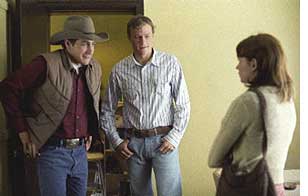 Ennis
is a man of few words until he meets the more outgoing Jack. Both men grew
up on a ranch. Ennis lost his parents when he was young and Jack rides in
a rodeo to impress his Dad. The key to understanding these two men, and
their differences, lies in the lessens Ennis took from his father. The old
man taught his son to hate homosexuals and Ennis grew up hating this part
of himself. When Jack suggests that they settle down on a ranch together,
Ennis relates a tale from his childhood. There were "two tough old birds"
who lived together on a ranch and they "was a joke in town." One night they
were beaten to death with a tire iron and Ennis' father made sure that his
sons saw what happened. "For all I know," Ennis states, "He done the job."
The incident scarred Ennis for life and a deep rooted self hatred renders
him incapable of accepting Jack's offer. If "this thing comes over us in
the wrong place," Ennis insists, they will be dead. "If you can't fix it
Jack, you gotta stand it." That only leaves room for the occasional fishing
trip and a denial of their true selves. Ennis
is a man of few words until he meets the more outgoing Jack. Both men grew
up on a ranch. Ennis lost his parents when he was young and Jack rides in
a rodeo to impress his Dad. The key to understanding these two men, and
their differences, lies in the lessens Ennis took from his father. The old
man taught his son to hate homosexuals and Ennis grew up hating this part
of himself. When Jack suggests that they settle down on a ranch together,
Ennis relates a tale from his childhood. There were "two tough old birds"
who lived together on a ranch and they "was a joke in town." One night they
were beaten to death with a tire iron and Ennis' father made sure that his
sons saw what happened. "For all I know," Ennis states, "He done the job."
The incident scarred Ennis for life and a deep rooted self hatred renders
him incapable of accepting Jack's offer. If "this thing comes over us in
the wrong place," Ennis insists, they will be dead. "If you can't fix it
Jack, you gotta stand it." That only leaves room for the occasional fishing
trip and a denial of their true selves. |
|
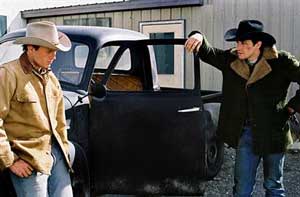 It
is one of the saddest love stories ever filmed and it comes with a remarkable
lineage. It was, first, a 1997 short story published in The New Yorker
by noted author Annie Proulx. It was then adapted for the screen by Larry
McMurtry, the author of Lonesome Dove (also considered a revisionist
Western), and his writing partner, Diana Ossana. After many false starts,
(Gus Van Sant was once attached to the project),
Brokeback Mountain was directed
with skill by Ang Lee (Taking Woodstock)
and brought unforgettably to life by Ledger and Gyllenhaal. Lee was an excellent
choice; he had also treated gay characters with great sensitivity and courage
when he directed The Wedding Banquet
in 1994. It
is one of the saddest love stories ever filmed and it comes with a remarkable
lineage. It was, first, a 1997 short story published in The New Yorker
by noted author Annie Proulx. It was then adapted for the screen by Larry
McMurtry, the author of Lonesome Dove (also considered a revisionist
Western), and his writing partner, Diana Ossana. After many false starts,
(Gus Van Sant was once attached to the project),
Brokeback Mountain was directed
with skill by Ang Lee (Taking Woodstock)
and brought unforgettably to life by Ledger and Gyllenhaal. Lee was an excellent
choice; he had also treated gay characters with great sensitivity and courage
when he directed The Wedding Banquet
in 1994. |
|
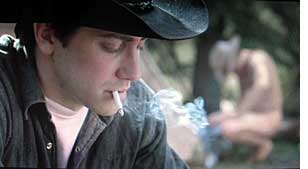 This
wasn't the first time that the movies dared to suggest that cowboys could
be queer. Ranchers pranced and preened on the prairie in Andy Warhol's Lonesome
Cowboys (1968). In John Schlesinger's
Midnight Cowboy (1969), Dustin Hoffman tells John Voight that his
Western attire is "faggot stuff" as Voight screams, "Are you calling John
Wayne a fag?" The cowpoke campfire scene was deconstructed in Van Sant's
My Own Private Idaho (1991) when
River Phoenix confessed his love to Keanu Reeves. Critic Leslie Fiedler
famously wrote about hidden and coded homosexuality in the American Western
and Brokeback Mountain brings
this right out into the forefront. This was a hard pill for some to swallow.
The Hollywood stereotype of the "manly" cowboy, is embedded into our collective
consciousness, and the myths of the Old West are sacred cows. (One could
ask why those who sometimes slaughtered Native Americans are called heroes
but this is a topic for another essay.) Brokeback
Mountain made many people uncomfortable, while others had
their eyes opened by this movie and finally recognized that not all gay
men are hairdressers and fashionistas. This
wasn't the first time that the movies dared to suggest that cowboys could
be queer. Ranchers pranced and preened on the prairie in Andy Warhol's Lonesome
Cowboys (1968). In John Schlesinger's
Midnight Cowboy (1969), Dustin Hoffman tells John Voight that his
Western attire is "faggot stuff" as Voight screams, "Are you calling John
Wayne a fag?" The cowpoke campfire scene was deconstructed in Van Sant's
My Own Private Idaho (1991) when
River Phoenix confessed his love to Keanu Reeves. Critic Leslie Fiedler
famously wrote about hidden and coded homosexuality in the American Western
and Brokeback Mountain brings
this right out into the forefront. This was a hard pill for some to swallow.
The Hollywood stereotype of the "manly" cowboy, is embedded into our collective
consciousness, and the myths of the Old West are sacred cows. (One could
ask why those who sometimes slaughtered Native Americans are called heroes
but this is a topic for another essay.) Brokeback
Mountain made many people uncomfortable, while others had
their eyes opened by this movie and finally recognized that not all gay
men are hairdressers and fashionistas. |
|
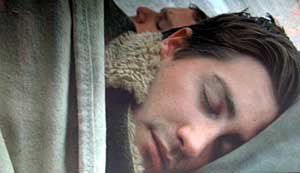 Brokeback
Mountain
questions society's notions of masculinity and turns them upside down. For
those who dismiss the notion of the Marlboro Man being on the down low,
I ask this question: what is a cowboy? How does the flashy "Rhinestone
Cowboy" of Glen Campbell's song fit into the archetype? Does riding a horse
in a rodeo while dressing like Liberace make you a "real" cowboy? And wasn't
it ridiculous watching then-President Bush swagger around in a cowboy hat
and designer boots, and speaking in a Texas drawl, when he was actually
a rich WASP who was born in Connecticut? Brokeback
Mountain
questions society's notions of masculinity and turns them upside down. For
those who dismiss the notion of the Marlboro Man being on the down low,
I ask this question: what is a cowboy? How does the flashy "Rhinestone
Cowboy" of Glen Campbell's song fit into the archetype? Does riding a horse
in a rodeo while dressing like Liberace make you a "real" cowboy? And wasn't
it ridiculous watching then-President Bush swagger around in a cowboy hat
and designer boots, and speaking in a Texas drawl, when he was actually
a rich WASP who was born in Connecticut? |
|
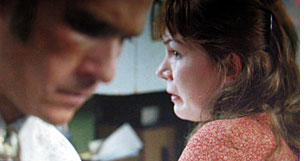 Brokeback
Mountain
examines homophobia as a destructive force in people's lives. Need I point
out that, the year after Proulx first wrote the story, Matthew Shepard was
beaten, tied to a fence, and left to die in Laramie, Wyoming? There was
no gay pride during the 60s and the era's bigotry forces Ennis and Jack
to deny the greatest passion that either of them will ever know. Brokeback
Mountain is important because it is also about the effect
that homophobia has on families when people wed only because they are expected
to. Like the wake of a hurricane, the debris of two love-less marriages
is left behind. Look at how devastated Alma (Michelle Williams) is when
she realizes that her marriage to Ennis is a lie. Williams' performance
as Alma is a study in sorrow like I haven't seen since the films of Ingmar
Bergman. Brokeback
Mountain
examines homophobia as a destructive force in people's lives. Need I point
out that, the year after Proulx first wrote the story, Matthew Shepard was
beaten, tied to a fence, and left to die in Laramie, Wyoming? There was
no gay pride during the 60s and the era's bigotry forces Ennis and Jack
to deny the greatest passion that either of them will ever know. Brokeback
Mountain is important because it is also about the effect
that homophobia has on families when people wed only because they are expected
to. Like the wake of a hurricane, the debris of two love-less marriages
is left behind. Look at how devastated Alma (Michelle Williams) is when
she realizes that her marriage to Ennis is a lie. Williams' performance
as Alma is a study in sorrow like I haven't seen since the films of Ingmar
Bergman. |
|
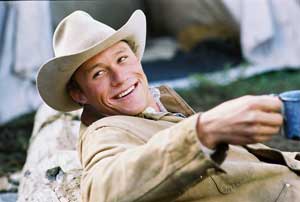 As
is the late Heath Ledger's starring turn as Ennis. His performance is a
small miracle. At times he appears to be the reincarnation of James Dean;
he fully disappears into his character and makes it his own. This is a man
who has been beaten down by life. It is a struggle for him to speak and,
as played by Ledger, the words often strangle in his throat. The pain in
his eyes is unmistakable. He has built walls around himself and wears his
cowboy attire as a suit of armor. But there's nowhere to hide and, wherever
he turns, he finds Jack. Gyllenhaal is also terrific as the man that Ennis
just can't bring himself to swear his undying love to. His performance is
no less heartfelt than Ledger's. As
is the late Heath Ledger's starring turn as Ennis. His performance is a
small miracle. At times he appears to be the reincarnation of James Dean;
he fully disappears into his character and makes it his own. This is a man
who has been beaten down by life. It is a struggle for him to speak and,
as played by Ledger, the words often strangle in his throat. The pain in
his eyes is unmistakable. He has built walls around himself and wears his
cowboy attire as a suit of armor. But there's nowhere to hide and, wherever
he turns, he finds Jack. Gyllenhaal is also terrific as the man that Ennis
just can't bring himself to swear his undying love to. His performance is
no less heartfelt than Ledger's. |
|
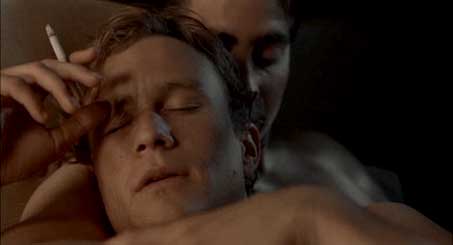 |
|
| Lee doesn't offer us a pretty travelogue. We are treated to postcard mountain photography but elsewhere the landscape and settings are often arid and bleak. Brokeback Mountain, for a time, is a stand-in for Eden and our lads enjoy good times together before their expulsion from paradise. There are dangers too; one of the sheep is gored by coyotes, a bear spooks Ennis' horse, and their boss watches them through binoculars one day and he doesn't look pleased. The following summer, Jack tries to get his old job back and is told there is no work. When Jack asks his old boss (Randy Quaid) if Ennis has come by, the boss-man looks coldly at him and says, "You boys sure found a way to make the time pass up there... you guys wasn't getting paid to leave the dogs baby-sit the sheep while you stemmed the rose." | |
|
One small
criticism. Our lads age very convincingly but I can spot fake facial hair
a mile away. And Gyllenhaal, (who is almost always photographed bearded
when he's not in a film playing someone clean shaven), was more than capable
of growing his own moustache for those scenes. Again, minor quibble. It's
just something I notice; I usually catch continuity errors with beard
stubble in movies too. |
|
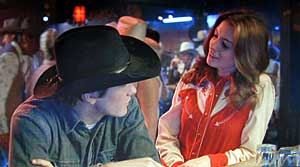 There
has been much speculation about the ending. [BIG TIME SPOILER ALERT NEXT
THREE PARAGRAPHS!] Ennis learns that Jack is dead and calls his widow.
Lureen (Anne Hathaway), whose own tragedy is conveyed by the increasing
amounts of peroxide in her hair, tells him that Jack was fixing a flat when
the tire exploded and the rim slammed into his face. Suddenly there is a
flash cut to Jack being beaten with a tire iron by a gang of toughs. It
only lasts a few seconds but it jolts you out of your seat. I have always
interpreted this shocking image to be what Ennis thinks really happened
and not meant to be taken as a literal flashback. But it is also, sadly,
quite possible that Jack's wife is lying and he really did die at
the hands of gay bashers. This ambiguity is a large part of Brokeback
Mountain's brilliance. We will never know for sure, and it
can be debated endlessly, but it is certainly the embodiment of
everything that Ennis feared. There
has been much speculation about the ending. [BIG TIME SPOILER ALERT NEXT
THREE PARAGRAPHS!] Ennis learns that Jack is dead and calls his widow.
Lureen (Anne Hathaway), whose own tragedy is conveyed by the increasing
amounts of peroxide in her hair, tells him that Jack was fixing a flat when
the tire exploded and the rim slammed into his face. Suddenly there is a
flash cut to Jack being beaten with a tire iron by a gang of toughs. It
only lasts a few seconds but it jolts you out of your seat. I have always
interpreted this shocking image to be what Ennis thinks really happened
and not meant to be taken as a literal flashback. But it is also, sadly,
quite possible that Jack's wife is lying and he really did die at
the hands of gay bashers. This ambiguity is a large part of Brokeback
Mountain's brilliance. We will never know for sure, and it
can be debated endlessly, but it is certainly the embodiment of
everything that Ennis feared. |
|
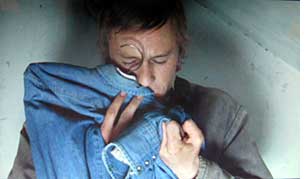 What
follows is one of the most heartbreaking scenes in the history of cinema.
Ennis visits Jack's parents and steps into his lover's old room. Jack would
stay there from time to time and his mother kept it as it was when her son
was still a boy. Ennis is dumbstruck when he looks into the closet and finds
one of the shirts that Jack wore back when they first met. The sleeve is
still caked with Ennis' blood from the fight they had on the day they left
Brokeback Mountain. But wait, there's another sleeve sticking out from under
the cuff and Ennis is further stunned to find his missing shirt
inside of Jack's, like "two skins." He hugs the two shirts to his chest,
struggling against tears. He will never be loved like this again and his
wasted life crashes down on him. What
follows is one of the most heartbreaking scenes in the history of cinema.
Ennis visits Jack's parents and steps into his lover's old room. Jack would
stay there from time to time and his mother kept it as it was when her son
was still a boy. Ennis is dumbstruck when he looks into the closet and finds
one of the shirts that Jack wore back when they first met. The sleeve is
still caked with Ennis' blood from the fight they had on the day they left
Brokeback Mountain. But wait, there's another sleeve sticking out from under
the cuff and Ennis is further stunned to find his missing shirt
inside of Jack's, like "two skins." He hugs the two shirts to his chest,
struggling against tears. He will never be loved like this again and his
wasted life crashes down on him. |
|
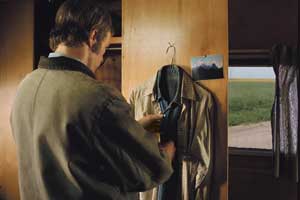 Finally,
there is a brief epilogue in which Ennis is visited by his adult daughter.
She is getting married and asks for her father's blessing. Ennis is a broken
and unhappy man, living in a small trailer. He has one question for his
daughter: does he love you? Ennis learned his lesson too
late. When his daughter leaves, he folds the sweater she forgot and opens
a closet. A postcard of Brokeback Mountain is tacked to the door. ((It just
hit me that the picture of the mountain on the postcard is actually quite
ugly, dark and blurry... as opposed to the beauty we saw at the beginning
through our cowboys' eyes.) And, next to the postcard, the two shirts are
also hanging there - except that Jack's shirt is now on the inside. Ennis
lovingly closes the top button and mumbles "Jack, I swear..." while choking
back tears. Finally,
there is a brief epilogue in which Ennis is visited by his adult daughter.
She is getting married and asks for her father's blessing. Ennis is a broken
and unhappy man, living in a small trailer. He has one question for his
daughter: does he love you? Ennis learned his lesson too
late. When his daughter leaves, he folds the sweater she forgot and opens
a closet. A postcard of Brokeback Mountain is tacked to the door. ((It just
hit me that the picture of the mountain on the postcard is actually quite
ugly, dark and blurry... as opposed to the beauty we saw at the beginning
through our cowboys' eyes.) And, next to the postcard, the two shirts are
also hanging there - except that Jack's shirt is now on the inside. Ennis
lovingly closes the top button and mumbles "Jack, I swear..." while choking
back tears. |
|
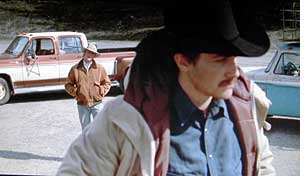 I
clearly remember the first time I saw the film and what a cathartic experience
it was. Allow me a personal remembrance as I couldn't possibly have first
seen this film under any better conditions than I did. It came to Buffalo
in early January, 2006. We'd heard all the buzz for the last few weeks.
Normally I don't give a flying feck about box office grosses. How much money
a film makes has nothing to do with its artistry; if that was the case Transformers
II would be one of the ten greatest films of all time. Brokeback
Mountain out-grossed all of the major studio releases despite
opening on fewer screens, and the mainstream critics were fawning over it.
I had been eagerly awaiting it, especially since the previous September.
That was when an old colleague, from my days as editor of a local entertainment
paper called Metro Weekend, e-mailed me from the Toronto Film Festival.
Michael Calleri wrote the movie column in Weekend, and also did film
reviews on Channel 4 News. We share an interest in Hitchcock.
He sent me an e-mail from Toronto with four words: "Brokeback Mountain
is brilliant!" I
clearly remember the first time I saw the film and what a cathartic experience
it was. Allow me a personal remembrance as I couldn't possibly have first
seen this film under any better conditions than I did. It came to Buffalo
in early January, 2006. We'd heard all the buzz for the last few weeks.
Normally I don't give a flying feck about box office grosses. How much money
a film makes has nothing to do with its artistry; if that was the case Transformers
II would be one of the ten greatest films of all time. Brokeback
Mountain out-grossed all of the major studio releases despite
opening on fewer screens, and the mainstream critics were fawning over it.
I had been eagerly awaiting it, especially since the previous September.
That was when an old colleague, from my days as editor of a local entertainment
paper called Metro Weekend, e-mailed me from the Toronto Film Festival.
Michael Calleri wrote the movie column in Weekend, and also did film
reviews on Channel 4 News. We share an interest in Hitchcock.
He sent me an e-mail from Toronto with four words: "Brokeback Mountain
is brilliant!" |
|
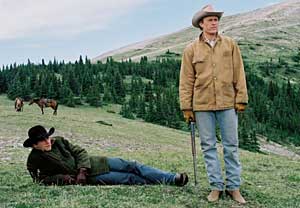 The
film opened at the North Park Theater. This independent house is one of
the oldest movie theaters in Buffalo. It is big, its decor screams 1920s,
and the screen is huge. My life partner, Andy, and I attended the opening weekend
there. We met another couple at the theater and also discovered that we
knew at least a quarter of the gay men and women in the sold out audience.
The atmosphere was nothing like when I saw Making
Love in 1982 and the audience whooped with laughter when Harry Hamlin
and Michael Ontkean kissed. What a difference two decades make. The vibe
in the North Park Theater was amazing. And there was something wonderful
about seeing this magnificent film for the first time on a big screen in
an old movie theater. It wouldn't have been the same at a multi-plex. We
could feel like audiences did in the 1940s when Humphrey Bogart kissed Ingrid
Bergman on the tarmac at the end of Casablanca. It was the experience
of watching an old MGM romance on a big screen during Hollywood's Golden
Age and finally it was two men, larger than life, who were making
our hearts flutter. When Ennis found the shirts, it seemed as if the entire
theater was crying. The
film opened at the North Park Theater. This independent house is one of
the oldest movie theaters in Buffalo. It is big, its decor screams 1920s,
and the screen is huge. My life partner, Andy, and I attended the opening weekend
there. We met another couple at the theater and also discovered that we
knew at least a quarter of the gay men and women in the sold out audience.
The atmosphere was nothing like when I saw Making
Love in 1982 and the audience whooped with laughter when Harry Hamlin
and Michael Ontkean kissed. What a difference two decades make. The vibe
in the North Park Theater was amazing. And there was something wonderful
about seeing this magnificent film for the first time on a big screen in
an old movie theater. It wouldn't have been the same at a multi-plex. We
could feel like audiences did in the 1940s when Humphrey Bogart kissed Ingrid
Bergman on the tarmac at the end of Casablanca. It was the experience
of watching an old MGM romance on a big screen during Hollywood's Golden
Age and finally it was two men, larger than life, who were making
our hearts flutter. When Ennis found the shirts, it seemed as if the entire
theater was crying. |
|
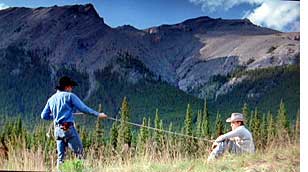 Predictably,
there were factions within the gay community who complained that this was
just another tragic story about self loathing homosexuals with no happy
ending and one of them dead, probably murdered. But Annie Proulx didn't
set out to write a story with a fairy tale ending, she wanted to expose
institutionalized homophobia for the cancer that it is. Ennis and Jack's
tale, filled with joy and sadness, is universal and the film proved that
a love story between two men could inspire the masses without preaching
to the choir. Never mind what people like Pat Robertson and the Rev, Fred
Phelps said about it. (I think the only thing Phelps hates more than this
movie is The Laramie Project.) Great art has the ability to effect
change and Brokeback Mountain
profoundly moved a lot of people. It's impact cannot be overstated. Predictably,
there were factions within the gay community who complained that this was
just another tragic story about self loathing homosexuals with no happy
ending and one of them dead, probably murdered. But Annie Proulx didn't
set out to write a story with a fairy tale ending, she wanted to expose
institutionalized homophobia for the cancer that it is. Ennis and Jack's
tale, filled with joy and sadness, is universal and the film proved that
a love story between two men could inspire the masses without preaching
to the choir. Never mind what people like Pat Robertson and the Rev, Fred
Phelps said about it. (I think the only thing Phelps hates more than this
movie is The Laramie Project.) Great art has the ability to effect
change and Brokeback Mountain
profoundly moved a lot of people. It's impact cannot be overstated. |
|
|
More On Ang Lee: |